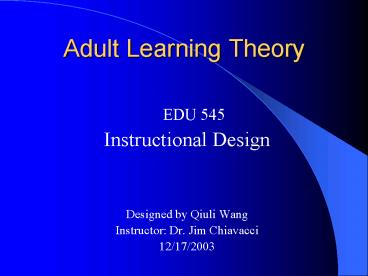Adult Learning Theory - PowerPoint PPT Presentation
1 / 16
Title:
Adult Learning Theory
Description:
Cross (1981) presents the Characteristics of Adults as Learners (CAL) ... Adults need to know why they should learn something before devoting the energy to it. ... – PowerPoint PPT presentation
Number of Views:108
Avg rating:3.0/5.0
Title: Adult Learning Theory
1
Adult Learning Theory
- EDU 545
- Instructional Design
- Designed by Qiuli Wang
- Instructor Dr. Jim Chiavacci
- 12/17/2003
2
Table of contents
- Introduction
- The Adult Learner Characteristics
- Learning Principles
- Assumption About the Adult Learning
- Assumption About the Adult learner
- Worksheet
- Traditional View of Adult Development
- Conclusion
3
Introduction
- Cross (1981) presents the Characteristics of
Adults as Learners (CAL) model in the context of
her analysis of lifelong learning programs. - The CAL model consists of two classes of
variables personal characteristics and
situational characteristics. Personal
characteristics include aging, life phases, and
developmental stages. Life phases and
developmental stages (e.g., marriage, job
changes, retirement).Situation characteristic
involves a series of plateaus and transitions
which may or may not be directly related to age.
4
The Adult Learner Characteristic
- The learner's self-concept
- The role of the learner's experience
- Readiness to learn
- Orientation to learning
- Need to know
- Motivation
5
The learner's self-concept
- Once adults have arrived at the stage where they
take responsibility for their own lives, they
develop a deep psychological need to be seen and
treated by others as being capable of
self-direction.
6
The role of the learner's experience
- Adults enter a learning experience with both a
greater volume and wider diversity of experience
over children
7
Readiness to learn
- Adults are ready to learn what they need to know
and be able to do in order to cope effectively
with their real-life contexts.
8
Orientation to learning
- Adults are problem-centered, or life-centered,
in their learning orientation. They are motivated
to learn to the extent that learning will help
them perform tasks or deal with real-life
problems.
9
Need to know
- Adults need to know why they should learn
something before devoting the energy to it.
10
Motivation
- The best motivators are internal, such as
self-esteem, quality of life, or increased job
satisfaction.
11
Learning Principle
- 1. Adults both desire and enact a tendency toward
- self-directedness as they mature.
- 2. Adults learn more effectively through
experiential techniques of education such as
discussion or problem solving. - 3. Adults are aware of specific learning
needs generated by real life tasks or problems.
- 4. Adults are competency based learners in
that they wish to apply newly acquired skills
or knowledge to their immediate circumstances.
12
Assumption about the adult learner
- Adult learners are diverse, bringing a wealth of
life experiences to the learning situation - Adult learners want to be able to relate content
to specific contexts in their lives - Adult learners prefer to have some degree of
control over their learning. - The adults sense of self has a significant
influence on the meaning of the learning
situation for that person
13
Assumption about the adult Learning
- Learning is an active process of construction of
meaning. - A fundamental aim of education is the
development. - A fundamental aim of instruction is to facilitate
growth in critical thinking, problem solving, and
learning to learn. - Adults learn best when they have an opportunity
to apply theory to practical situations in their
own lives.
14
Worksheet
- We separate three groups, based on the age and
work experience. - Each group has two questions.
- Summary each persons answers.
- Sharing opinion of each group
15
Traditional View of Adult Development
- Pre-Adulthood(17-22)
- Early Adulthood
- Entering the adult world (22-28)
- Age thirty transition (28-33)
- Settling down (33-40)
- Middle Adulthood
- Mid-Life Transition (40-45)
- Entering middle adulthood (45-50)
- Age fifty transition (50-60)
- Late Adulthood
- Late adult transition (60-65)
16
conclusion
- As educators, we should understand the unique
characteristics. Then we meet the adult learner
need. - As adult learner, we should know ourselves
special need. Then we obtain the knowledge and
skill which our life need.































